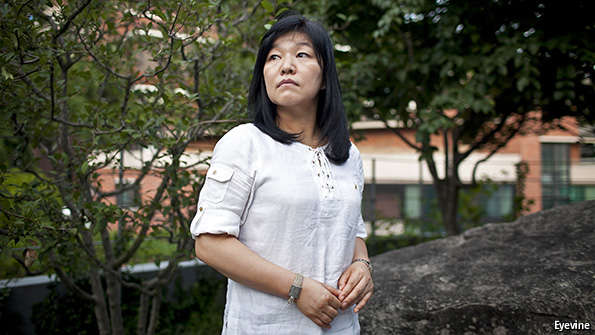
SINCE the Korean War, Western writing on Korea has focused mostly on the contrast between North and South. But the past sixty years include a number of heartbreaking and overlooked stories of the South, a poor agrarian state that quickly transformed into an industrial powerhouse, and a dictatorial "democracy" that evolved into a sound republic.
Kyung-Sook Shin, both the only Korean and the only woman to win the Man Asian Literary Prize, is also the only author whose novels of those lost Korean decades have broken through as bestsellers to international audiences. In her three translated works—"Please Look After Mom", "I'll Be Right There" and her forthcoming novel, "The Girl Who Wrote Loneliness" (released by Pegasus Books on September 15)—Ms Shin opens her nation's transition and her people's struggle to the world that looked away for all those years.
"Please Look After Mom", Ms Shin's poignant examination of of how Korea's evolution has impacted the different generations, gave birth to these other translations. But her later works are still more profound. They describe South Korea in the 1970s and 1980s, when workers fought to unionise against intolerable factory conditions, and a youth movement faced a bloody government crackdown to fight for democracy. It was these turbulent times and dark places that birthed the writer in Ms Shin.
On a warm summer day earlier this year, at a café at the foot of Bugaksan, the mountain where Ms Shin's home stands today, the author came to discuss her forthcoming translation. For some writers, novels pour forth from a character or a question. For Ms Shin, "A space is very important for a piece of writing." That is clear from her writing: her novels are very much from a specific place and a time.
In "The Girl Who Wrote Loneliness", the setting elevates this coming-of-age novel, beginning with a song that stamps the story with a feeling of hopelessness. "Perhaps," she writes, "[the song] 'What Can I Do?' has conquered the entire city." In the poor, agricultural Korea of the 1970s—Japan was still five times richer than its neighbour—this plaintive query is pervasive. Ms Shin's generation could not see through the fog of repression to what they could do.
But urbanisation and industry were soon to sweep in, along with exploitation and oppression; many bartered the hardship of the assembly line (and the chance to take night classes) for the possibility of a dream. The unnamed protagonist, like Ms Shin, comes to the city with the hopes of becoming a writer. At her factory job, she witnesses suicides, mourns deaths and watches the attempts to unionise get crushed. At the end of the day she retires to one more hopeless place, the "lone room" she shares with family members, both a respite and another prison. It comes to stand as a symbol of Seoul and South Korea as it was then: a place where dreams flocked in an effort to bud in darkness, a city filled with millions of starry-eyed hopefuls, a country of dreams deferred for the the next generation.
Ms Shin writes that "fiction merely follows the trails of life." Although "The Girl Who Wrote Loneliness" is not a memoir, "almost all the stories in the novel are true," she says. While "I'll Be Right There" stays firmly in the oppressive past, "The Girl Who Wrote Loneliness" offers relief from 1970's Seoul by repeatedly leaping 16 years ahead, when the protagonist has found success as a writer. But even there, seemingly safe in the '90s, Ms Shin's protagonist is reproached by former classmates, one of whom states, "You don't seem to write about us." She cannot escape the hardest years of her life, when friends' deaths turned her into "an infinite blank".
"Pain and suffering is not a bad thing," Ms Shin says. "We have to accept the scars and go on with our life." Seoul has certainly moved on. It's difficult to sense those scars and the sacrifice amidst the modernity. The skyscrapers, standing in contrast with the ancient ramparts and old mountains, feel as if they were erected at a hectic, video-game pace. The mirrored edifices of Microsoft and other modern tech companies have replaced the tiny flats and their lone rooms. And while South Korea is but a whisper of its former self, Ms Shin's writing grabs hold of those memories and brings them loudly to the surface.
